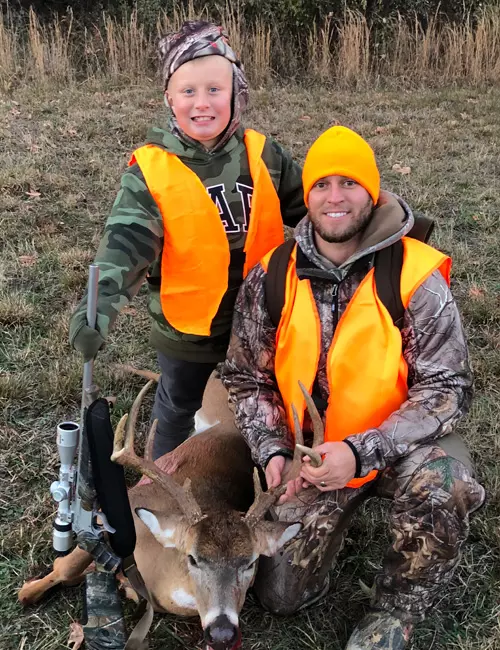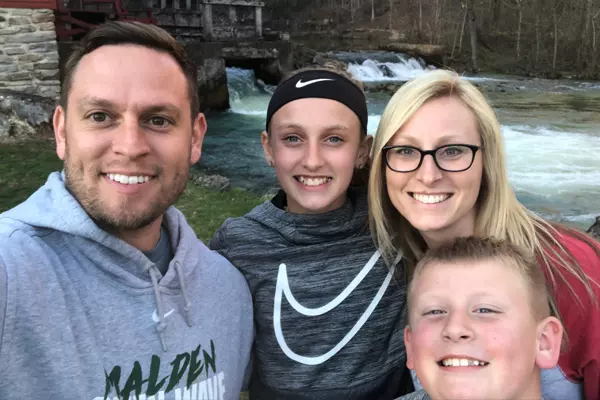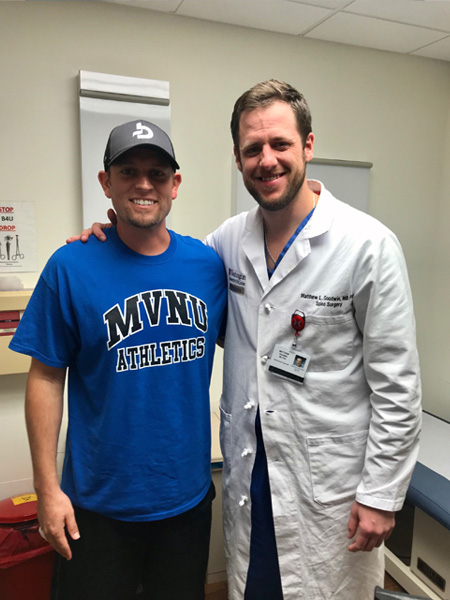- Home
- Patient Stories
- Spinal Fracture and Spinal Cord Injury - Mike Vipperman
Spinal Fracture and Spinal Cord Injury
By: Crystal Huff
Hear Mike talk about his accident with KMOV News 4
 It was September 21st — fall had finally arrived. Mike Vipperman like many others was excited deer season was underway and he was finally able to get out in the woods in search for this year’s ten point buck.
It was September 21st — fall had finally arrived. Mike Vipperman like many others was excited deer season was underway and he was finally able to get out in the woods in search for this year’s ten point buck.
But as he climbed up to the top of his deer stand, he lost his footing and fell 18 feet.
“I felt my back break and everything was numb. I was having a hard time breathing and thought I was going to die out there,” says Mike.
After a moment, Mike realized he was able to use his arms. He got his phone out of his coat, laid it on his chest and called his wife Becky. Luckily, Mike had decided to hunt in the woods behind his house, but Becky was not familiar with the woods or his location. She woke up their eight-year-old son, Maverick, who not only located his dad but was instrumental in getting the ambulance to him.
“He [Maverick] is my hero and saved my life,” states Mike.
Once the ambulance arrived, they realized Mike had a spinal cord injury and needed to be Airlifted out because they could not risk him being jostled around in the ambulance during the trek back to the road. Mike lives in Malden, Missouri, which is about three hours south of St. Louis. He was first taken to a local hospital in Cape Girardeau where scans revealed Mike had indeed broken his spine in multiple places. Part of Mike’s fractured spine was pushing on his spinal cord, and he had eight broken ribs and a collapsed lung as well.
Due to the extent of his injuries, Mike needed to be flown to Barnes-Jewish Hospital where he met Matthew Goodwin, MD, PhD, a Spine Surgeon with Washington University Orthopedics.
Dr. Goodwin explains, “Mr. Vipperman had a complicated spinal cord injury, but also multiple fractures throughout his thoracic spine, including a cracked and broken pedicle, the broad flat plate of bone that connects the posterior spine to the anterior spine and protects the spinal cord. It had cracked and was poking into his spinal cord. He had very poor function in his lower extremities. I told him and his family I was willing to work as long as it took to pull the bone fragments out of his spinal cord and then put the spine back together, but there were no guarantees we could improve his leg function.”
Mike’s collapsed lung required a chest tube before he could make the flight to Barnes-Jewish Hospital. He says, “My recollection of things is a little fuzzy because of the pain medication but I know they were preparing my wife, Becky, for the possibility of me never walking again.”
 When Becky arrived at Barnes-Jewish Hospital, the doctors set her down with the social worker. She was told that as of right now, he is paralyzed from the waist down and it’s most likely that he would never walk again. She says she remembers being quiet and not really reacting and the social worker asked if she was okay. Becky says she responded with, “We serve a big God and I am not believing that report right now.” Becky remembers this being the only disheartening conversation, as Dr. Goodwin and the staff were so positive and hopeful.
When Becky arrived at Barnes-Jewish Hospital, the doctors set her down with the social worker. She was told that as of right now, he is paralyzed from the waist down and it’s most likely that he would never walk again. She says she remembers being quiet and not really reacting and the social worker asked if she was okay. Becky says she responded with, “We serve a big God and I am not believing that report right now.” Becky remembers this being the only disheartening conversation, as Dr. Goodwin and the staff were so positive and hopeful.
“I do remember Dr. Goodwin being so upbeat and instantly liking him and feeling put at ease,” says Mike.
“My role is to do the surgery, but to also talk the family and patient through this time. Even though we do this every day, it is a life-altering event with lots of uncertainty and frustrations for patients, and I do my best to help them through that. For me, it starts in preop when we meet. Often times, families are a bit in shock and sad when these injuries happen. My job is to meet them and keep it real while also keeping it positive,” says Dr. Goodwin.
Dr. Goodwin believes in being pretty direct in these situations. “It’s a bad deal, the cord is injured and the spine is broken. They may not walk again. We cannot change the accident but what we can do is focus on how to do our best in the moment. I give them the game plan and tell them life is full of lots of bad things. For this bad thing (a spinal cord injury), patients are truly in as good a place as possible and are going to get world class care from a team of providers who share a common goal.”
In this case Dr. Goodwin did have a bit of work to do, but says he was incredibly lucky in that the OR staff at Barnes-Jewish Hospital and specifically in the spine division, always rallies and pulls together for these cases — no questions asked.
During the operation the bone fragment was able to be removed from Mike’s spinal cord, and there were a few tears in the lining that covers his spinal cord and a few thoracic nerve roots had to be tied off. To complicate things, there was Cerebrospinal Fluid (CSF) leaking, but it was stopped pretty quickly. “We got his spine reduced while carefully decompressing his spinal cord, and he had dramatic improvements post operatively,” explains Dr. Goodwin.
“Because of my faith in the Lord and the wisdom of Dr. Goodwin, I came out of surgery able to move my left foot and had slight movement in my right foot.” By the second day post-surgery, Mike was able to move his legs. “I cannot say enough about the positive attitudes of the staff. They were all so encouraging and so supportive and the quality of care was excellent.”
Becky says, “I am so thankful for Dr. Goodwin’s steady hands and taking all the necessary precautions. We were told that during the 12 hour surgery, after pieces of the bone fragments were removed from Mike’s spine, Dr. Goodwin would wake Mike up periodically to keep checking his ability to move his toes just as a precaution.”
Dr. Goodwin says, “While I may be the one that gets all the credit. I am one of like 50 on a 50 plus person team. From the resident that saw him and immediately started working on preparing the OR, to Kathy and the OR staff opening a room and calling in an anesthesiologist and nursing team, it really is a team sport where I am pretty useless on my own. Mike is walking today due in large part to the unsung heroes in the operating room and the team in POD5 that night, most of whom Mike has never met.”
 After three days, Mike was able to walk ten steps and quickly moved from ICU to a regular room. Within two weeks, he was being transferred to a rehabilitation center closer to home.
After three days, Mike was able to walk ten steps and quickly moved from ICU to a regular room. Within two weeks, he was being transferred to a rehabilitation center closer to home.
Mike says, “I was told I’d be looking at 14-20 days at the rehabilitation center and was discharged and home within seven days.” At his one month post-op appointment, Mike was able to walk completely unassisted. Mike recalls, “Dr. Goodwin came in and asked if I was able to walk and I said yes and hopped up and walked around and Dr. Goodwin gave me a high-five.”
“Mike’s progress has been nothing short of phenomenal, but as I have gotten to know him through this, this has not surprised me! Although our surgery was critical, possibly even more important was the positive attitude Mike kept throughout this. It truly is our pleasure to do what we do at the highest level. Seeing patients like Mike make it worth it on a daily (and nightly) basis,” says Dr. Goodwin. Mike will need to continue outpatient physical therapy for the next three to six months and says he plans on getting back to hunting. “I will definitely get back out in the woods this year but definitely plan on hunting from the ground for a while.”
More Info: